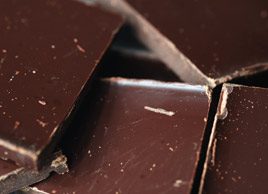Is chocolate healthy?
Chocolate: Is it good for you, or bad for you? Well, it won’t exactly help you lose weight. But researchers are finding good reasons to call dark chocolate a superfood

Source: Best Health Magazine, March/April 2009
Why chocolate is good for you
‘ Chocolate may improve your skin
Researchers at Germany’s Heinrich Heine University exposed chocolate eaters to ultraviolet light and found that after six weeks, they had 15 percent less skin reddening than those who didn’t eat it. ‘We believe the compounds in chocolate act as UV filters,’ says study leader Wilhelm Stahl. After 12 weeks, the chocolate eaters’ skin was 16 percent denser and 42 percent less scaly. Concerned about it causing acne? Researchers at Australia’s University of Newcastle reviewed the evidence and found nothing to suggest that chocolate triggers blemishes.
‘ Chocolate checks cancer
Georgetown University researchers found that when breast cancer cells were treated with chocolate flavanols, the cells stopped dividing. The findings could also apply to other cancers.
‘ Chocolate helps blood flow
Dr. Norman Hollenberg of Harvard Medical School found that rates of stroke, heart disease, cancer and diabetes are less than 10 percent among Panama’s Kuna people, who drink up to 40 cups of cocoa per week. ‘The epicatechin in cocoa increases nitric oxide, which dilates vessels and improves blood flow,’ he says. His belief is that epicatechin should be considered essential in our diet and should be classed as a vitamin.
‘ Chocoate boosts the brain
A brain-imaging study on healthy women at Britain’s University of Nottingham found flavanol-rich cocoa increased blood flow to their brains for two to three hours. Researchers believe cocoa could benefit older adults with dementia and Alzheimer’s.
‘ Chocolate relieves fatigue
Chronic fatigue syndrome patients who ate 1.6 ounces (45 grams) of dark chocolate daily for eight weeks were less tired than when fed placebos. Researchers think it boosts the neurotransmitters regulating sleep and mood.
Why chocolate is bad for you
‘ Chocolate worsens moods
People who eat excessive chocolate for comfort run the risk of making their mood worse, says Gordon Parker of the Prince of Wales Hospital in Sydney, Australia. He found that emotional eaters look for an opioid effect to lift their mood, but a chocolate ‘high’ is short-lived and may make the comedown worse. ‘Chocolate acts on the same neurological system as serotonin, but you’d have to eat a truckload to match the effect of one antidepressant tablet.’
‘ Chocolate is missing nutrients
Confectionery makers remove healthy flavanols such as epicatechins because of their bitter taste. ‘When you get up to 80 percent cocoa, the taste is bitter and almost unpalatable for some,’ says Mary Engler of the cardiovascular and genomics graduate program at the University of California. ‘For health benefits, choose dark over milk, and greater than 60 percent cocoa content.’
‘ Chocolate may weaken bones
A study of elderly women who ate chocolate daily found that their bones were not as dense as those who ate it less than once a week. It’s possible that the oxalate in chocolate stops calcium absorption, and sugar may increase calcium excretion.
‘ Chocolate is high in fat
You get a lot of calories in a relatively small volume of chocolate: One ounce (28 grams) of 60 percent cocoa has 162 calories. On average, about 50 percent of the energy in chocolate is from fat. But in chocolate’s favour is the fact that about half of its saturated fat is stearic acid, which raises ‘good’ HDL cholesterol and doesn’t increase ‘bad’ LDL cholesterol. Its high fat content helps control release of glucose into the blood system, so it is not all bad for people with diabetes.
The verdict: Is chocolate healthy?
The average Canadian devours the equivalent of 100 chocolate bars per year. Those who love it and want to take advantage of its health benefits’after all, it can boost blood antioxidant levels by nearly 20 percent’should choose chocolate with a high cocoa content.
Alan Crozier, professor of plant biochemistry and human nutrition at the University of Glasgow in Scotland, has found that milk added to chocolate cancels out many of its benefits. ‘Milk inhibits the absorption of epicatechins. Almost all of the research on the protective effects of chocolate has been done with a drink that is very rich in epicatechins.’
Until manufacturers consistently list the amount of cocoa (including epicatechins) on labels, researchers suggest sticking to dark chocolate with 70 percent cocoa or higher. Consider drinking cocoa instead of eating chocolate, so you can control the fat and calories.
This article was originally titled "Sinful or Sweet?" in the March/April 2009 issue of Best Health. Subscribe today and never miss an issue!




